https://www.cnblogs.com/xiaojianliu/p/8473095.html
阅读目录回到目录
framebuffer机制模仿显卡的功能,将显卡硬件结构抽象为一系列的数据结构,可以通过framebuffer的读写直接对显存进行操作。用户可以将framebuffer看成是显存的一个映像,将其映射到进程空间后,就可以直接进行读写操作,写操作会直接反映在屏幕上。 帧缓冲设备为标准的字符型设备,在Linux中主设备号29,定义在/include/linux/major.h中的FB_MAJOR,次设备号定义帧缓冲的个数,最大允许有32个FrameBuffer,定义在/include/linux/fb.h中的FB_MAX,对应于文件系统下/dev/fb%d设备文件,使用如下方式(前面的数字表示次设备号):
0 = /dev/fb0 第一个fb 设备
1 = /dev/fb1 第二个fb 设备 fb 也是一种普通的内存设备,可以像内存设备(/dev/mem)一样,对其read,write,seek 以及mmap。但区别在于fb 使用的不是整个内存区,而是显存部分。 典型的显示机制如图所示: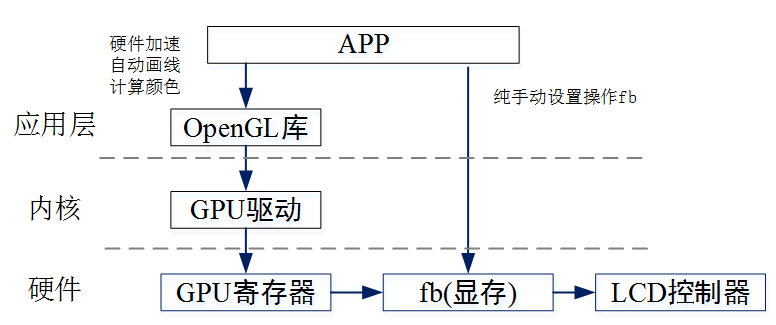 回到目录
回到目录
打开/dev/fbn设备文件。 (2) 用ioctl()操作取得当前显示屏幕的参数,如屏幕分辨率、每个像素点的比特数。根据屏幕参数可计算屏幕缓冲区的大小。 (3) 用mmap()函数,将屏幕缓冲区映射到用户空间。 (4) 映射后就可以直接读/写屏幕缓冲区,进行绘图和图片显示了。 (5) 使用完帧缓冲设备后需要将其释放。 (6) 关闭文件。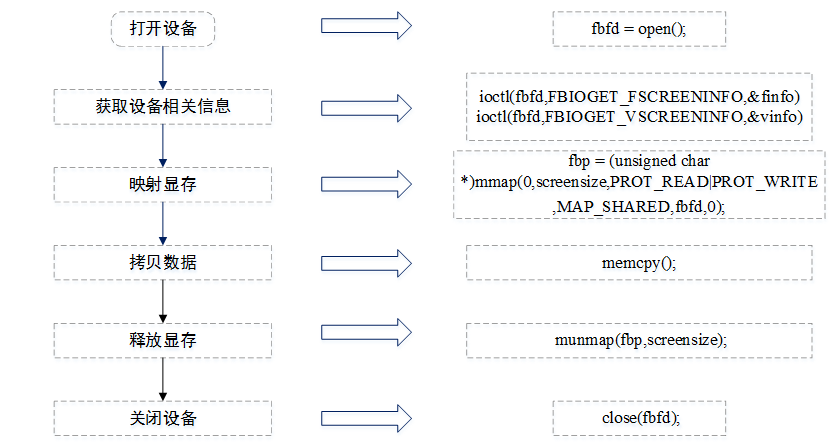 回到目录
回到目录中。这个头文件是内核源码中的,由于交叉编译器中将其包含了,所以我们可以在应用层直接调用。
,里面定义了一些ioctl的命令
/* ioctls
0x46 is 'F' */
#define FBIOGET_VSCREENINFO 0x4600
#define FBIOPUT_VSCREENINFO 0x4601
#define FBIOGET_FSCREENINFO 0x4602
#define FBIOGETCMAP 0x4604
#define FBIOPUTCMAP 0x4605
#define FBIOPAN_DISPLAY 0x4606
我们主要使用FBIOGET_VSCREENINFO和FBIOGET_FSCREENINFO 命令。从字面意思我们不难看出,这两个命令的意思分别为
fb’s ioctl, to get variable screen info:获取应用程序可改变的参数(如设定的分辨率)
fb’s ioctl, to get fixed screen info:获取固定的参数(如屏幕的分辨率,一般只是拿来看看)
中还提供了专门的结构体类型,用来存放上述两个参数。
存放可变参数的结构体类型:struct fb_var_screeninfo,其详细定义参照“相关结构体”部分。
比较重要的可变参数有:
xres、yres:可视画面的x、y轴分辨率(应用层改不了)
xres_virtual、yres_virtual:虚拟画面(即fb)x、y轴分辨率
xoffset、yoffset:可视画面相对于虚拟画面的x、y轴偏移量
bits_per_pixel:像素深度
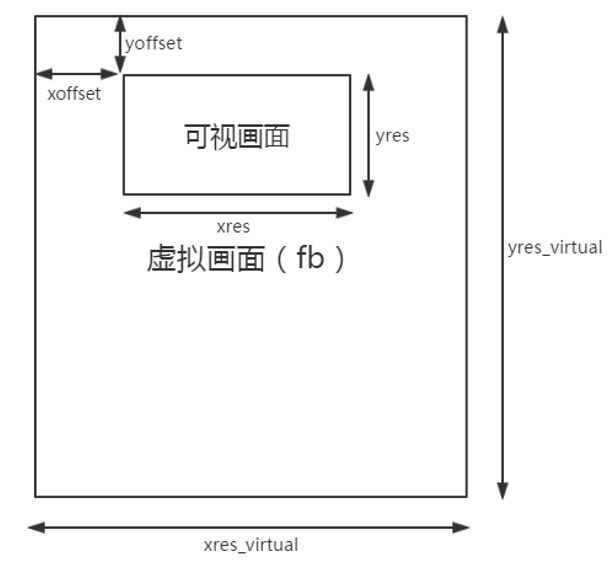 虚拟画面一般会被默认设为(不一定的)可视画面的两倍,这种结构被称之为“双缓冲机制”,这样做的好处是可以一边显示,一边缓冲下一幅画面 。
虚拟画面一般会被默认设为(不一定的)可视画面的两倍,这种结构被称之为“双缓冲机制”,这样做的好处是可以一边显示,一边缓冲下一幅画面 。
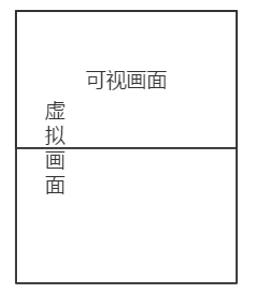 回到目录
回到目录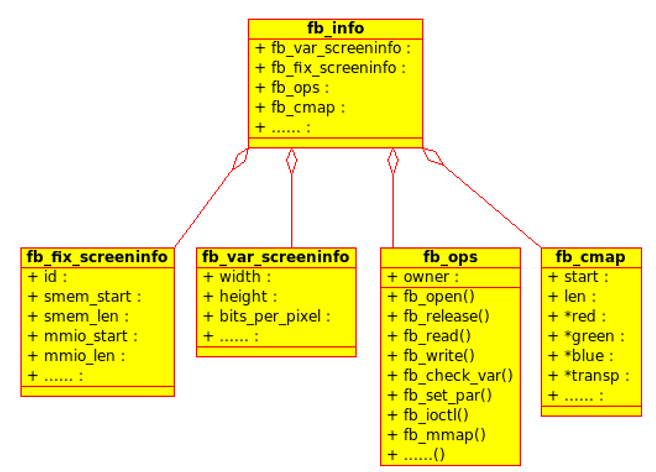
 struct fb_var_screeninfo
{
__u32 xres; /* visible resolution */
__u32 yres;
__u32 xres_virtual; /* virtual resolution */
__u32 yres_virtual;
__u32 xoffset; /* offset from virtual to visible resolution */
__u32 yoffset;
__u32 bits_per_pixel; /* guess what */
__u32 grayscale; /* != 0 Gray levels instead of colors */
struct fb_bitfield red; /* bitfield in fb mem if true color, */
struct fb_bitfield green; /* else only length is significant */
struct fb_bitfield blue;
struct fb_bitfield transp; /* transparency */
__u32 nonstd; /* != 0 Non standard pixel format */
__u32 activate; /* see FB_ACTIVATE_* */
__u32 height; /* height of picture in mm */
__u32 width; /* width of picture in mm */
__u32 accel_flags; /* acceleration flags (hints) */
/* Timing: All values in pixclocks, except pixclock (of course) */
__u32 pixclock; /* pixel clock in ps (pico seconds) */
__u32 left_margin; /* time from sync to picture */
__u32 right_margin; /* time from picture to sync */
__u32 upper_margin; /* time from sync to picture */
__u32 lower_margin;
__u32 hsync_len; /* length of horizontal sync */
__u32 vsync_len; /* length of vertical sync */
__u32 sync; /* see FB_SYNC_* */
__u32 vmode; /* see FB_VMODE_* */
__u32 reserved[6]; /* Reserved for future compatibility */
};
struct fb_var_screeninfo
{
__u32 xres; /* visible resolution */
__u32 yres;
__u32 xres_virtual; /* virtual resolution */
__u32 yres_virtual;
__u32 xoffset; /* offset from virtual to visible resolution */
__u32 yoffset;
__u32 bits_per_pixel; /* guess what */
__u32 grayscale; /* != 0 Gray levels instead of colors */
struct fb_bitfield red; /* bitfield in fb mem if true color, */
struct fb_bitfield green; /* else only length is significant */
struct fb_bitfield blue;
struct fb_bitfield transp; /* transparency */
__u32 nonstd; /* != 0 Non standard pixel format */
__u32 activate; /* see FB_ACTIVATE_* */
__u32 height; /* height of picture in mm */
__u32 width; /* width of picture in mm */
__u32 accel_flags; /* acceleration flags (hints) */
/* Timing: All values in pixclocks, except pixclock (of course) */
__u32 pixclock; /* pixel clock in ps (pico seconds) */
__u32 left_margin; /* time from sync to picture */
__u32 right_margin; /* time from picture to sync */
__u32 upper_margin; /* time from sync to picture */
__u32 lower_margin;
__u32 hsync_len; /* length of horizontal sync */
__u32 vsync_len; /* length of vertical sync */
__u32 sync; /* see FB_SYNC_* */
__u32 vmode; /* see FB_VMODE_* */
__u32 reserved[6]; /* Reserved for future compatibility */
};

 struct fb_fix_screeninfo {
char id[16]; /* identification string eg "TT Builtin" */
unsigned long smem_start; /* Start of frame buffer mem */
/* (physical address) */
__u32 smem_len; /* Length of frame buffer mem */
__u32 type; /* see FB_TYPE_* */
__u32 type_aux; /* Interleave for interleaved Planes */
__u32 visual; /* see FB_VISUAL_* */
__u16 xpanstep; /* zero if no hardware panning */
__u16 ypanstep; /* zero if no hardware panning */
__u16 ywrapstep; /* zero if no hardware ywrap */
__u32 line_length; /* length of a line in bytes */
unsigned long mmio_start; /* Start of Memory Mapped I/O */
/* (physical address) */
__u32 mmio_len; /* Length of Memory Mapped I/O */
__u32 accel; /* Type of acceleration available */
__u16 reserved[3]; /* Reserved for future compatibility */
};
struct fb_fix_screeninfo {
char id[16]; /* identification string eg "TT Builtin" */
unsigned long smem_start; /* Start of frame buffer mem */
/* (physical address) */
__u32 smem_len; /* Length of frame buffer mem */
__u32 type; /* see FB_TYPE_* */
__u32 type_aux; /* Interleave for interleaved Planes */
__u32 visual; /* see FB_VISUAL_* */
__u16 xpanstep; /* zero if no hardware panning */
__u16 ypanstep; /* zero if no hardware panning */
__u16 ywrapstep; /* zero if no hardware ywrap */
__u32 line_length; /* length of a line in bytes */
unsigned long mmio_start; /* Start of Memory Mapped I/O */
/* (physical address) */
__u32 mmio_len; /* Length of Memory Mapped I/O */
__u32 accel; /* Type of acceleration available */
__u16 reserved[3]; /* Reserved for future compatibility */
};

 struct fb_ops {
/* open/release and usage marking */
struct module *owner;
int (*fb_open)(struct fb_info *info, int user);
int (*fb_release)(struct fb_info *info, int user);
/* get non settable parameters */
int (*fb_get_fix)(struct fb_fix_screeninfo *fix, int con,
struct fb_info *info);
/* get settable parameters */
int (*fb_get_var)(struct fb_var_screeninfo *var, int con,
struct fb_info *info);
/* set settable parameters */
int (*fb_set_var)(struct fb_var_screeninfo *var, int con,
struct fb_info *info);
/* get colormap */
int (*fb_get_cmap)(struct fb_cmap *cmap, int kspc, int con,
struct fb_info *info);
/* set colormap */
int (*fb_set_cmap)(struct fb_cmap *cmap, int kspc, int con,
struct fb_info *info);
/* pan display (optional) */
int (*fb_pan_display)(struct fb_var_screeninfo *var, int con,
struct fb_info *info);
/* perform fb specific ioctl (optional) */
int (*fb_ioctl)(struct inode *inode, struct file *file, unsigned int cmd,
unsigned long arg, int con, struct fb_info *info);
/* perform fb specific mmap */
int (*fb_mmap)(struct fb_info *info, struct file *file, struct
vm_area_struct *vma);
/* switch to/from raster image mode */
int (*fb_rasterimg)(struct fb_info *info, int start);
};
struct fb_ops {
/* open/release and usage marking */
struct module *owner;
int (*fb_open)(struct fb_info *info, int user);
int (*fb_release)(struct fb_info *info, int user);
/* get non settable parameters */
int (*fb_get_fix)(struct fb_fix_screeninfo *fix, int con,
struct fb_info *info);
/* get settable parameters */
int (*fb_get_var)(struct fb_var_screeninfo *var, int con,
struct fb_info *info);
/* set settable parameters */
int (*fb_set_var)(struct fb_var_screeninfo *var, int con,
struct fb_info *info);
/* get colormap */
int (*fb_get_cmap)(struct fb_cmap *cmap, int kspc, int con,
struct fb_info *info);
/* set colormap */
int (*fb_set_cmap)(struct fb_cmap *cmap, int kspc, int con,
struct fb_info *info);
/* pan display (optional) */
int (*fb_pan_display)(struct fb_var_screeninfo *var, int con,
struct fb_info *info);
/* perform fb specific ioctl (optional) */
int (*fb_ioctl)(struct inode *inode, struct file *file, unsigned int cmd,
unsigned long arg, int con, struct fb_info *info);
/* perform fb specific mmap */
int (*fb_mmap)(struct fb_info *info, struct file *file, struct
vm_area_struct *vma);
/* switch to/from raster image mode */
int (*fb_rasterimg)(struct fb_info *info, int start);
};

 struct fb_cmap {
__u32 start; /* First entry */
__u32 len; /* Number of entries */
__u16 *red; /* Red values */
__u16 *green;
__u16 *blue;
__u16 *transp; /* transparency, can be NULL */
};
struct fb_cmap {
__u32 start; /* First entry */
__u32 len; /* Number of entries */
__u16 *red; /* Red values */
__u16 *green;
__u16 *blue;
__u16 *transp; /* transparency, can be NULL */
};

 struct fb_info {
char modename[40]; /* default video mode */
kdev_t node;
int flags;
int open; /* Has this been open already ? */
#define FBINFO_FLAG_MODULE 1 /* Low-level driver is a module */
struct fb_var_screeninfo var; /* Current var */
struct fb_fix_screeninfo fix; /* Current fix */
struct fb_monspecs monspecs; /* Current Monitor specs */
struct fb_cmap cmap; /* Current cmap */
struct fb_ops *fbops;
char *screen_base; /* Virtual address */
struct display *disp; /* initial display variable */
struct vc_data *display_fg; /* Console visible on this display */
char fontname[40]; /* default font name */
devfs_handle_t devfs_handle; /* Devfs handle for new name */
devfs_handle_t devfs_lhandle; /* Devfs handle for compat. symlink */
int (*changevar)(int); /* tell console var has changed */
int (*switch_con)(int, struct fb_info*);
/* tell fb to switch consoles */
int (*updatevar)(int, struct fb_info*);
/* tell fb to update the vars */
void (*blank)(int, struct fb_info*); /* tell fb to (un)blank the screen */
/* arg = 0: unblank */
/* arg > 0: VESA level (arg-1) */
void *pseudo_palette; /* Fake palette of 16 colors and
the cursor's color for non
palette mode */
/* From here on everything is device dependent */
void *par;
};
struct fb_info {
char modename[40]; /* default video mode */
kdev_t node;
int flags;
int open; /* Has this been open already ? */
#define FBINFO_FLAG_MODULE 1 /* Low-level driver is a module */
struct fb_var_screeninfo var; /* Current var */
struct fb_fix_screeninfo fix; /* Current fix */
struct fb_monspecs monspecs; /* Current Monitor specs */
struct fb_cmap cmap; /* Current cmap */
struct fb_ops *fbops;
char *screen_base; /* Virtual address */
struct display *disp; /* initial display variable */
struct vc_data *display_fg; /* Console visible on this display */
char fontname[40]; /* default font name */
devfs_handle_t devfs_handle; /* Devfs handle for new name */
devfs_handle_t devfs_lhandle; /* Devfs handle for compat. symlink */
int (*changevar)(int); /* tell console var has changed */
int (*switch_con)(int, struct fb_info*);
/* tell fb to switch consoles */
int (*updatevar)(int, struct fb_info*);
/* tell fb to update the vars */
void (*blank)(int, struct fb_info*); /* tell fb to (un)blank the screen */
/* arg = 0: unblank */
/* arg > 0: VESA level (arg-1) */
void *pseudo_palette; /* Fake palette of 16 colors and
the cursor's color for non
palette mode */
/* From here on everything is device dependent */
void *par;
};
 回到目录
回到目录 #include
#include
#include
#include
#include
#include
#include
#include
#include
#include
#define FBDEVICE “/dev/fb0”
void draw_back(unsigned int *pfb, unsigned int width, unsigned int height, unsigned int color); void draw_line(unsigned int *pfb, unsigned int width, unsigned int height); int main(void)
{
int fd = -1;
int ret = -1;
unsigned int *pfb = NULL;
struct fb_fix_screeninfo finfo;
struct fb_var_screeninfo vinfo;
{
unsigned int x, y;
for (y = 0; y < height; y++)
{
for (x = 0; x < width; x++)
{
*(pfb + y * width + x) = color;
}
}
} void draw_line(unsigned int *pfb, unsigned int width, unsigned int height)
{
unsigned int x, y;
for (x = 50; x < width - 50; x++)
{
*(pfb + 50 * width + x) = 0xffffff00;
}
for (y = 50; y < height -50; y++)
{
*(pfb + y * width + 50) = 0xffffff00;
}
}
阅读目录回到目录
framebuffer 帧缓冲
帧缓冲(framebuffer)是Linux 系统为显示设备提供的一个接口,它将显示缓冲区抽象,屏蔽图像硬件的底层差异,允许上层应用程序在图形模式下直接对显示缓冲区进行读写操作。用户不必关心物理显示缓冲区的具体位置及存放方式,这些都由帧缓冲设备驱动本身来完成。framebuffer机制模仿显卡的功能,将显卡硬件结构抽象为一系列的数据结构,可以通过framebuffer的读写直接对显存进行操作。用户可以将framebuffer看成是显存的一个映像,将其映射到进程空间后,就可以直接进行读写操作,写操作会直接反映在屏幕上。 帧缓冲设备为标准的字符型设备,在Linux中主设备号29,定义在/include/linux/major.h中的FB_MAJOR,次设备号定义帧缓冲的个数,最大允许有32个FrameBuffer,定义在/include/linux/fb.h中的FB_MAX,对应于文件系统下/dev/fb%d设备文件,使用如下方式(前面的数字表示次设备号):
0 = /dev/fb0 第一个fb 设备
1 = /dev/fb1 第二个fb 设备 fb 也是一种普通的内存设备,可以像内存设备(/dev/mem)一样,对其read,write,seek 以及mmap。但区别在于fb 使用的不是整个内存区,而是显存部分。 典型的显示机制如图所示:
 回到目录
回到目录fb与应用程序的交互
对于用户程序而言,它和其他的设备并没有什么区别,用户可以把fb看成是一块内存,既可以向内存中写数据,也可以读数据。fb的显示缓冲区位于内核空间,应用程序可以把此空间映射到自己的用户空间,在进行操作。 (1) 在应用程序中,操作/dev/fbn的一般步骤如下:打开/dev/fbn设备文件。 (2) 用ioctl()操作取得当前显示屏幕的参数,如屏幕分辨率、每个像素点的比特数。根据屏幕参数可计算屏幕缓冲区的大小。 (3) 用mmap()函数,将屏幕缓冲区映射到用户空间。 (4) 映射后就可以直接读/写屏幕缓冲区,进行绘图和图片显示了。 (5) 使用完帧缓冲设备后需要将其释放。 (6) 关闭文件。
 回到目录
回到目录fb的控制
ioctl来用各种命令控制fb,控制的实现都定义在 虚拟画面一般会被默认设为(不一定的)可视画面的两倍,这种结构被称之为“双缓冲机制”,这样做的好处是可以一边显示,一边缓冲下一幅画面 。
虚拟画面一般会被默认设为(不一定的)可视画面的两倍,这种结构被称之为“双缓冲机制”,这样做的好处是可以一边显示,一边缓冲下一幅画面 。
 回到目录
回到目录相关结构体
相关结构体及其关系为:
fb_var_screeninfo
这个结构描述了显示卡的特性。 struct fb_var_screeninfo
{
__u32 xres; /* visible resolution */
__u32 yres;
__u32 xres_virtual; /* virtual resolution */
__u32 yres_virtual;
__u32 xoffset; /* offset from virtual to visible resolution */
__u32 yoffset;
__u32 bits_per_pixel; /* guess what */
__u32 grayscale; /* != 0 Gray levels instead of colors */
struct fb_bitfield red; /* bitfield in fb mem if true color, */
struct fb_bitfield green; /* else only length is significant */
struct fb_bitfield blue;
struct fb_bitfield transp; /* transparency */
__u32 nonstd; /* != 0 Non standard pixel format */
__u32 activate; /* see FB_ACTIVATE_* */
__u32 height; /* height of picture in mm */
__u32 width; /* width of picture in mm */
__u32 accel_flags; /* acceleration flags (hints) */
/* Timing: All values in pixclocks, except pixclock (of course) */
__u32 pixclock; /* pixel clock in ps (pico seconds) */
__u32 left_margin; /* time from sync to picture */
__u32 right_margin; /* time from picture to sync */
__u32 upper_margin; /* time from sync to picture */
__u32 lower_margin;
__u32 hsync_len; /* length of horizontal sync */
__u32 vsync_len; /* length of vertical sync */
__u32 sync; /* see FB_SYNC_* */
__u32 vmode; /* see FB_VMODE_* */
__u32 reserved[6]; /* Reserved for future compatibility */
};
struct fb_var_screeninfo
{
__u32 xres; /* visible resolution */
__u32 yres;
__u32 xres_virtual; /* virtual resolution */
__u32 yres_virtual;
__u32 xoffset; /* offset from virtual to visible resolution */
__u32 yoffset;
__u32 bits_per_pixel; /* guess what */
__u32 grayscale; /* != 0 Gray levels instead of colors */
struct fb_bitfield red; /* bitfield in fb mem if true color, */
struct fb_bitfield green; /* else only length is significant */
struct fb_bitfield blue;
struct fb_bitfield transp; /* transparency */
__u32 nonstd; /* != 0 Non standard pixel format */
__u32 activate; /* see FB_ACTIVATE_* */
__u32 height; /* height of picture in mm */
__u32 width; /* width of picture in mm */
__u32 accel_flags; /* acceleration flags (hints) */
/* Timing: All values in pixclocks, except pixclock (of course) */
__u32 pixclock; /* pixel clock in ps (pico seconds) */
__u32 left_margin; /* time from sync to picture */
__u32 right_margin; /* time from picture to sync */
__u32 upper_margin; /* time from sync to picture */
__u32 lower_margin;
__u32 hsync_len; /* length of horizontal sync */
__u32 vsync_len; /* length of vertical sync */
__u32 sync; /* see FB_SYNC_* */
__u32 vmode; /* see FB_VMODE_* */
__u32 reserved[6]; /* Reserved for future compatibility */
};

fb_fix_screeninfon
这个结构在显卡被设定模式后创建,它描述显示卡的属性,并且系统运行时不能被修改;比如FrameBuffer内存的起始地址。它依赖于被设定的模式,当一个模 式被设定后,内存信息由显示卡硬件给出,内存的位置等信息就不可以修改。 struct fb_fix_screeninfo {
char id[16]; /* identification string eg "TT Builtin" */
unsigned long smem_start; /* Start of frame buffer mem */
/* (physical address) */
__u32 smem_len; /* Length of frame buffer mem */
__u32 type; /* see FB_TYPE_* */
__u32 type_aux; /* Interleave for interleaved Planes */
__u32 visual; /* see FB_VISUAL_* */
__u16 xpanstep; /* zero if no hardware panning */
__u16 ypanstep; /* zero if no hardware panning */
__u16 ywrapstep; /* zero if no hardware ywrap */
__u32 line_length; /* length of a line in bytes */
unsigned long mmio_start; /* Start of Memory Mapped I/O */
/* (physical address) */
__u32 mmio_len; /* Length of Memory Mapped I/O */
__u32 accel; /* Type of acceleration available */
__u16 reserved[3]; /* Reserved for future compatibility */
};
struct fb_fix_screeninfo {
char id[16]; /* identification string eg "TT Builtin" */
unsigned long smem_start; /* Start of frame buffer mem */
/* (physical address) */
__u32 smem_len; /* Length of frame buffer mem */
__u32 type; /* see FB_TYPE_* */
__u32 type_aux; /* Interleave for interleaved Planes */
__u32 visual; /* see FB_VISUAL_* */
__u16 xpanstep; /* zero if no hardware panning */
__u16 ypanstep; /* zero if no hardware panning */
__u16 ywrapstep; /* zero if no hardware ywrap */
__u32 line_length; /* length of a line in bytes */
unsigned long mmio_start; /* Start of Memory Mapped I/O */
/* (physical address) */
__u32 mmio_len; /* Length of Memory Mapped I/O */
__u32 accel; /* Type of acceleration available */
__u16 reserved[3]; /* Reserved for future compatibility */
};

fb_ops
用户应用可以使用ioctl()系统调用来操作设备,这个结构就是用以支持ioctl()的这些操作的。 struct fb_ops {
/* open/release and usage marking */
struct module *owner;
int (*fb_open)(struct fb_info *info, int user);
int (*fb_release)(struct fb_info *info, int user);
/* get non settable parameters */
int (*fb_get_fix)(struct fb_fix_screeninfo *fix, int con,
struct fb_info *info);
/* get settable parameters */
int (*fb_get_var)(struct fb_var_screeninfo *var, int con,
struct fb_info *info);
/* set settable parameters */
int (*fb_set_var)(struct fb_var_screeninfo *var, int con,
struct fb_info *info);
/* get colormap */
int (*fb_get_cmap)(struct fb_cmap *cmap, int kspc, int con,
struct fb_info *info);
/* set colormap */
int (*fb_set_cmap)(struct fb_cmap *cmap, int kspc, int con,
struct fb_info *info);
/* pan display (optional) */
int (*fb_pan_display)(struct fb_var_screeninfo *var, int con,
struct fb_info *info);
/* perform fb specific ioctl (optional) */
int (*fb_ioctl)(struct inode *inode, struct file *file, unsigned int cmd,
unsigned long arg, int con, struct fb_info *info);
/* perform fb specific mmap */
int (*fb_mmap)(struct fb_info *info, struct file *file, struct
vm_area_struct *vma);
/* switch to/from raster image mode */
int (*fb_rasterimg)(struct fb_info *info, int start);
};
struct fb_ops {
/* open/release and usage marking */
struct module *owner;
int (*fb_open)(struct fb_info *info, int user);
int (*fb_release)(struct fb_info *info, int user);
/* get non settable parameters */
int (*fb_get_fix)(struct fb_fix_screeninfo *fix, int con,
struct fb_info *info);
/* get settable parameters */
int (*fb_get_var)(struct fb_var_screeninfo *var, int con,
struct fb_info *info);
/* set settable parameters */
int (*fb_set_var)(struct fb_var_screeninfo *var, int con,
struct fb_info *info);
/* get colormap */
int (*fb_get_cmap)(struct fb_cmap *cmap, int kspc, int con,
struct fb_info *info);
/* set colormap */
int (*fb_set_cmap)(struct fb_cmap *cmap, int kspc, int con,
struct fb_info *info);
/* pan display (optional) */
int (*fb_pan_display)(struct fb_var_screeninfo *var, int con,
struct fb_info *info);
/* perform fb specific ioctl (optional) */
int (*fb_ioctl)(struct inode *inode, struct file *file, unsigned int cmd,
unsigned long arg, int con, struct fb_info *info);
/* perform fb specific mmap */
int (*fb_mmap)(struct fb_info *info, struct file *file, struct
vm_area_struct *vma);
/* switch to/from raster image mode */
int (*fb_rasterimg)(struct fb_info *info, int start);
};

fb_cmap
描述设备无关的颜 {MOD}映射信息。可以通过FBIOGETCMAP 和 FBIOPUTCMAP 对应的ioctl操作设定或获取颜 {MOD}映射信息。 struct fb_cmap {
__u32 start; /* First entry */
__u32 len; /* Number of entries */
__u16 *red; /* Red values */
__u16 *green;
__u16 *blue;
__u16 *transp; /* transparency, can be NULL */
};
struct fb_cmap {
__u32 start; /* First entry */
__u32 len; /* Number of entries */
__u16 *red; /* Red values */
__u16 *green;
__u16 *blue;
__u16 *transp; /* transparency, can be NULL */
};

fb_info
定义当显卡的当前状态;fb_info结构仅在内核中可见,在这个结构中有一个fb_ops指针,指向驱动设备工作所需的函数集。 struct fb_info {
char modename[40]; /* default video mode */
kdev_t node;
int flags;
int open; /* Has this been open already ? */
#define FBINFO_FLAG_MODULE 1 /* Low-level driver is a module */
struct fb_var_screeninfo var; /* Current var */
struct fb_fix_screeninfo fix; /* Current fix */
struct fb_monspecs monspecs; /* Current Monitor specs */
struct fb_cmap cmap; /* Current cmap */
struct fb_ops *fbops;
char *screen_base; /* Virtual address */
struct display *disp; /* initial display variable */
struct vc_data *display_fg; /* Console visible on this display */
char fontname[40]; /* default font name */
devfs_handle_t devfs_handle; /* Devfs handle for new name */
devfs_handle_t devfs_lhandle; /* Devfs handle for compat. symlink */
int (*changevar)(int); /* tell console var has changed */
int (*switch_con)(int, struct fb_info*);
/* tell fb to switch consoles */
int (*updatevar)(int, struct fb_info*);
/* tell fb to update the vars */
void (*blank)(int, struct fb_info*); /* tell fb to (un)blank the screen */
/* arg = 0: unblank */
/* arg > 0: VESA level (arg-1) */
void *pseudo_palette; /* Fake palette of 16 colors and
the cursor's color for non
palette mode */
/* From here on everything is device dependent */
void *par;
};
struct fb_info {
char modename[40]; /* default video mode */
kdev_t node;
int flags;
int open; /* Has this been open already ? */
#define FBINFO_FLAG_MODULE 1 /* Low-level driver is a module */
struct fb_var_screeninfo var; /* Current var */
struct fb_fix_screeninfo fix; /* Current fix */
struct fb_monspecs monspecs; /* Current Monitor specs */
struct fb_cmap cmap; /* Current cmap */
struct fb_ops *fbops;
char *screen_base; /* Virtual address */
struct display *disp; /* initial display variable */
struct vc_data *display_fg; /* Console visible on this display */
char fontname[40]; /* default font name */
devfs_handle_t devfs_handle; /* Devfs handle for new name */
devfs_handle_t devfs_lhandle; /* Devfs handle for compat. symlink */
int (*changevar)(int); /* tell console var has changed */
int (*switch_con)(int, struct fb_info*);
/* tell fb to switch consoles */
int (*updatevar)(int, struct fb_info*);
/* tell fb to update the vars */
void (*blank)(int, struct fb_info*); /* tell fb to (un)blank the screen */
/* arg = 0: unblank */
/* arg > 0: VESA level (arg-1) */
void *pseudo_palette; /* Fake palette of 16 colors and
the cursor's color for non
palette mode */
/* From here on everything is device dependent */
void *par;
};
 回到目录
回到目录使用实例
 #include
#include void draw_back(unsigned int *pfb, unsigned int width, unsigned int height, unsigned int color); void draw_line(unsigned int *pfb, unsigned int width, unsigned int height); int main(void)
{
int fd = -1;
int ret = -1;
unsigned int *pfb = NULL;
struct fb_fix_screeninfo finfo;
struct fb_var_screeninfo vinfo;
fd = open(FBDEVICE, O_RDWR);
if (fd < 0)
{
perror("open");
return -1;
}
printf("open %s success
", FBDEVICE);
ret = ioctl(fd, FBIOGET_FSCREENINFO, &finfo);
if (ret < 0)
{
perror("ioctl");
return -1;
}
ret = ioctl(fd, FBIOGET_VSCREENINFO, &vinfo);
if (ret < 0)
{
perror("ioctl");
return -1;
}
pfb = (unsigned int *)mmap(NULL, finfo.smem_len, PROT_READ | PROT_WRITE, MAP_SHARED, fd, 0);
if (NULL == pfb)
{
perror("mmap");
return -1;
}
printf("pfb :0x%x
", *pfb);
draw_back(pfb, vinfo.xres_virtual, vinfo.yres_virtual, 0xffff0000);
draw_line(pfb, vinfo.xres_virtual, vinfo.yres_virtual);
close(fd);
return 0;
}
void draw_back(unsigned int *pfb, unsigned int width, unsigned int height, unsigned int color){
unsigned int x, y;
for (y = 0; y < height; y++)
{
for (x = 0; x < width; x++)
{
*(pfb + y * width + x) = color;
}
}
} void draw_line(unsigned int *pfb, unsigned int width, unsigned int height)
{
unsigned int x, y;
for (x = 50; x < width - 50; x++)
{
*(pfb + 50 * width + x) = 0xffffff00;
}
for (y = 50; y < height -50; y++)
{
*(pfb + y * width + 50) = 0xffffff00;
}
}
